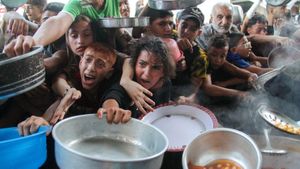Massive unrest is hitting Port-au-Prince, the capital of Haiti, with over 20,000 residents fleeing their homes due to relentless gang violence. Just within four days, this alarming surge of displacement has forced more than 17,000 individuals to seek refuge in 15 different sites as conditions deteriorate. Supply chains have nearly collapsed, adding to the sense of desperation on the streets. This crisis, the largest seen since August 2023, has roots stretching back to the instability following the 2021 assassination of President Jovenel Moïse. Organized gangs have fortified their hold on the city, exacerbated by the national police force's struggle to combat this rising tide of violence, leaving communities isolated.
Reports indicate almost total paralysis has enveloped Port-au-Prince, compounded by incidents like the targeted shooting at commercial aircraft, including one belonging to Spirit Airlines, landing at the national airport. This incident resulted not only in injuries but also led the US Federal Aviation Administration to impose a halt on flights, leaving the city feeling cut off from the outside world. Essential goods and services are scarce as the main seaport's accessibility remains limited due to gang control of surrounding roads.
According to Grégoire Goodstein, IOM’s Chief in Haiti, "the isolation of Port-au-Prince is amplifying an already dire humanitarian situation. With only 20 percent of the city being accessible, humanitarian workers face immense challenges getting to those who need help the most." This statement echoes the widespread sentiment of urgency surrounding the humanitarian crisis.
Escalation of gang violence has claimed nearly 4,000 lives so far this year, according to reports from the UN Human Rights Office. The situation is destabilizing rapidly, creating dire conditions, especially for women and children. Disturbingly, 94 percent of displaced women and girls find themselves at greater risk of violence, including sexual assault, which has often been weaponized by gangs as part of their campaign of terror.
Despite facing mounting pressure and limitations, organizations such as the International Organization for Migration (IOM) continue to press on with humanitarian efforts. They provide life-saving assistance through mobile clinics, offer rental subsidies to displaced families, deliver water to displacement sites, and engage with border crossings to assist migrants. The IOM remains committed to its mission amid the chaos, advocating for the observance of humanitarian principles, which are increasingly being threatened as violence escalates.
The IOM has urged all involved parties to uphold the neutrality and impartiality of humanitarian aid, emphasizing the necessity for unimpeded access to those most affected. They called for urgent international support to counterbalance the staggering funding shortfall they are facing—currently just 42 percent of the UN’s $674 million response plan is funded.
Experts are warning of worsening conditions without immediate help, insisting on the need for coordinated international efforts to stabilize the region. With increasing numbers fleeing their homes, advocates and humanitarian agencies alike recognize the situation as urgent and immediate action is necessary to prevent chaos from spiraling even more out of control.



